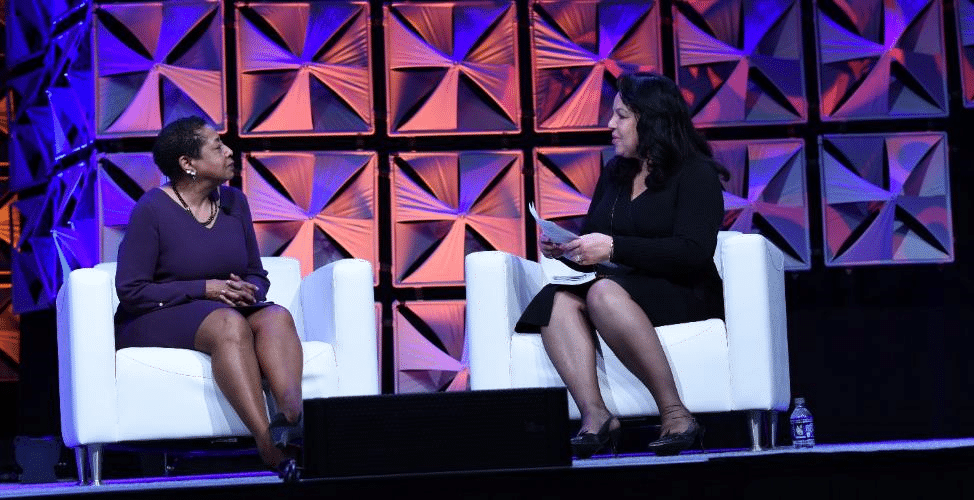#AACTE19 Closing Keynote Speakers Explore Millennial Generation Teachers

Annual Meeting Closing keynote speakers Mary Dilworth, editor of Millennial Teachers of Color, and Leslie Fenwick, dean emerita of Howard University, presented the topic, “Millennial Teachers of Color: Follow Their Lead, They Know Where We Need To Be,” on Sunday, February 24. During the session, the educators explored millennial teachers through a new lens by examining the intersection of race ethnicity and generation.
Dilworth has centered her career on teacher quality and preparation, with a keen focus on racial/ethnic and linguistic diversity and equity issues. Recently, she was a co-principal investigator for the National Science Foundation (NSF-DR12) project designed to recruit, prepare, license, and employ middle and high school science teachers from underrepresented groups. In addition, she served as a visiting professor and director of the Center for Urban Education at the University of the District of Columbia. Earlier in her career, she was a research fellow with Howard University’s Institute for the Study of Educational Policy (ISEP) and became widely recognized for heightening the national discourse on the disparate impact of licensing tests on underrepresented groups.
“We ought not to second guess millennials and millennial teachers of color and we need to follow their lead,” said Dilworth. “I believe they have the capacity to change schools and [educator] preparation if we give them the chance.”
The millennials comprise the age group 23-38 and is the largest racially, ethnically, and linguistically diverse group in the nation and the largest population of the U.S. workforce. Dilworth was inspired to research this demographic in her quest to identify alternative routes that could effect real change needed in society centered on social justice. In her book, Dilworth featured millennial teachers who articulates a multitude of factors to consider for creating a pipeline of well-qualified teachers of color.
During the session, Dilworth discussed the six generations and their characteristics: lost generation, silent generation, baby boomer generation, Generation X, Generation Y—better known as Millennials, and Generation Z. “For each generation, there’s going to be something about changing the educational paradigm,” she said.
In short, she argued that success in retaining new teachers could only happen when space and place for new ideas and the opportunity for growth are created within the education profession.
“[Millennials] have opinion and they have voice on teaching and teacher reforms but often we do not hear them because the important conversations do not take place in our college classrooms or in the teachers’ lounge,” Dilworth said. “They have worked to establish nonthreatening spaces outside of the academy and schools for intellectual work that will fine tune their teaching. In essence, they have developed their own professional development communities. There are credible clues as to why they step in and step out of education, and find comfort in learning from each other more so than from us. I think we would do well to formally invite them into our conversations.”
In response, Fenwick commends Dilworth. “I think it was very millennial of you to push away from the binary understandings of being a person of color and being a millennial and bring the intersection of those two conversations together,” she said.
Fenwick is a professor of leadership studies and education policy at the Howard University School of Education. She is a former visiting scholar and visiting fellow at Harvard University, Salzburg Fellow and a 2017-19 MCLC Senior Fellow at West Point Academy (USMA). She is also a co-founder of the Howard University-American Association of School Administrators (AASA) Urban Superintendents Academy and a past member of the Harvard University Principals Center Advisory Board.
In her remarks, Fenwick highlighted there are many things colliding for millennial teachers of color. They reference their own experiences coming through the PK-12 school system and use it as knowledge for when they become a teacher of color.
“I felt like the millennial teachers who are writing in this book are upfront with their identities and those identities are naturally still resonating with them as they look out at their classroom at children of color,” said Fenwick. “They are not adopting a poetry voice to talk about racism, sexism, xenophobia, and all the other isms that restrict opportunity. That’s very palpable in the book for millennials of color as well as millennials who are not of color. This desire of wanting to speak directly to the issues and then act on them.”
A video recording of the full AACTE 2019 Closing General Session, is available to Annual Meeting attendees at aacte.org. Additional video recordings of the opening General Session and all Deeper Dives from the 71st Annual Meeting may be accessed in the AACTE Resource Library.
Tags: Annual Meeting, diversity, equity, social justice, workforce development






